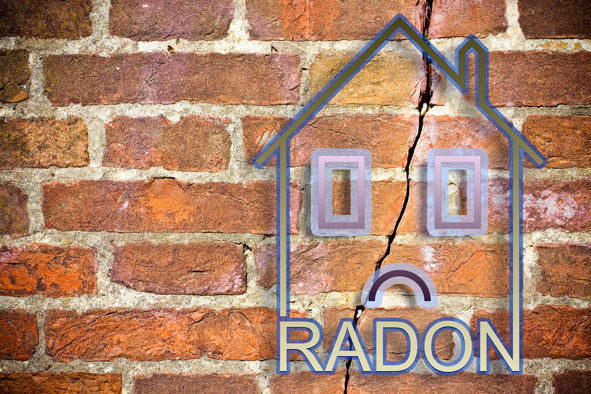What’s odorless, colorless, tasteless, is the leading cause of lung cancer among nonsmokers, and is responsible for about 21,000 lung cancer deaths every year in the United States?
Radon.
Radon is a naturally occurring radioactive gas produced by the breakdown of uranium in soil, rock, and water. Uranium is found in all soils and in higher concentrations in granite, shale, and phosphates. Because of Northern Nevada’s geologic composition and high quantities of granite, radon is more prevalent.
As it decays into radon gas, it moves through the soil into the atmosphere, where it harmlessly disperses outdoors. But, sometimes, it can enter buildings through foundation openings and become trapped inside where it can accumulate and present a health concern for occupants.
Radon breaks down into several radioactive elements called radon decay products, which are solid particles that become suspended in air. They are tiny, easily inhaled, and can attach to lung tissue. Not everyone exposed to radon will get lung cancer, but the more significant the amount of radon and the longer the exposure, the higher the risk of developing lung cancer.
In Nevada, one in four homes tested show radon concentrations at or above the EPA action level. According to experts, living in a house with radon concentrations at the action level poses a risk of developing lung cancer similar to the danger posed by smoking about half a pack of cigarettes a day.
Since you can’t see or smell radon, specialized equipment is needed to detect its presence.
A simple three-day test can determine if a house has a radon problem, and winter is an ideal time to test a home for radon.
Nevadans can order free test kits online at https://fee4freekit.eventbrite.com, or by mailing in the Radon Test Kit Order form, also available online for printing at http://bit.ly/NRAM18freekit. Ordered test kits will require $4 for shipping.
If your home is found to have elevated levels of radon, it can be fixed by installing a radon mitigation system in the home. EPA and the Nevada Division of Public and Behavioral Health recommend that you get a certified or licensed radon mitigation contractor to install the system. A radon mitigation contractor is a professional who can fix your home to reduce the radon level. Lowering high radon levels requires technical knowledge and unique skills.
To assist Nevada citizens, the Nevada Radon Education Program has compiled a list of Certified Mitigation Professionals in Nevada.
For more information, call the Radon Hotline at 888-RADON10 (888-723-6610) or visit the Nevada Radon Education Program website at www.RadonNV.com.

